provision - and opening up new opportunities for learning and
development as a result. Marianne Sargent explains.

Tidy-up time is arguably the bane of a young child's existence, particularly in the construction area, which adults often deem easy to pack away and relegate to a temporary space. However, valuable learning opportunities are pushed away with the block trolley every time it is stacked and rolled to the side.
As well as being ideal for teaching mathematical concepts of shape, space and measure, block play enables children to experience force and movement as they balance and build. Children also develop gross motor skills as they move, arrange and climb over large blocks, and practise fine motor control as they position and balance small blocks.
Large blocks can be used to build sets and backdrops to role play and to inspire storytelling through the creation of small-world settings and mo- dels. Children practise language and communication skills as they design and build together, and independence, confidence and self-esteem as they collaborate, problem solve and come up with creative ideas.
Allocate a permanent space for block play and these learning opportunities become tenfold.
WHOLE-SCHOOL APPROACH
Hassocks Infant School, West Sussex
Jeannie Hughes, head teacher of Hassocks Infant School in West Sussex, describes block play as a whole-school philosophy. 'We've got blocks everywhere. All nine classes have block-play areas both inside and outdoors. We've always used block play right the way through from Foundation to Year 2,' she says.
In fact, Mrs Hughes is such a strong believer in the power of block play that she involved her whole school staff in a year-long research project that has since resulted in the conversion of the old school library into a dedicated block-play space. There, children have access to both hollow and solid blocks, sourced from Community Playthings.
'I wanted to make the learning visible for the teachers and support their understanding of how block play covers all areas of the curriculum,' Mrs Hughes explains. 'We learned so much during the project about skills the children gain. It really inspired us.'
What stood out most was the motivational effect of block play on boys, says Mrs Hughes. Staff observed fewer disagreements, high levels of enthusiasm, and perseverance as the boys repeatedly returned to their models to modify and improve their designs over a period of days.
The project also highlighted the value of block play for raising individual children's self-esteem. Children who had previously been quiet and shy displayed greater confidence and resilience. Some even saw their status rise within the class due to newfound respect from their peers.
There were also significant benefits in terms of improving children's communication and language skills. Boys talked together more and demonstrated creative and critical thinking as they collaborated, negotiated and shared ideas. What's more, girls were seen to add other resources and create storylines as they played.
Mrs Hughes explains how the creation of the new space has reinforced the central position of block play within the school. 'The way the school's laid out, the block play space is central so you walk through it, which really gives it a high profile,' she says. 'It's a large space, so the children have plenty of room to take their own interests forward. They are free to do whatever they want and the things they build are absolutely phenomenal - really, really incredible.
'We don't insist it's tidied up at the end of the day. The children leave it out so they can revisit it the following day. It makes a huge difference because they do revisit it and revise what they have been building and change it.'
LEARNING FROM ICELAND
Naturally Learning, Cornwall
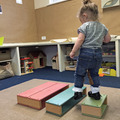 Mandy Richardson, director of childcare provider Naturally Learning in Cornwall, recently returned from Iceland where she was lucky enough to experience first-hand the benefits of having plenty of space for block play.
Mandy Richardson, director of childcare provider Naturally Learning in Cornwall, recently returned from Iceland where she was lucky enough to experience first-hand the benefits of having plenty of space for block play.
'The biggest difference in Iceland is space. All the nurseries are purpose built, whereas in this country many nurseries tend to be in buildings that were meant for something else,' says Mrs Richardson.
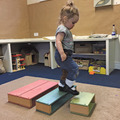 She describes an early learning environment that respects children's play by giving them space and priv- acy to indulge in self-directed activity. 'They had a lot of wooden blocks and rooms that the children would go into, shut the door and just play on their own with no adults. There were windows in the doors that the adults could look through, but the adults wouldn't go in because they didn't want to disturb the children.'
She describes an early learning environment that respects children's play by giving them space and priv- acy to indulge in self-directed activity. 'They had a lot of wooden blocks and rooms that the children would go into, shut the door and just play on their own with no adults. There were windows in the doors that the adults could look through, but the adults wouldn't go in because they didn't want to disturb the children.'
Mrs Richardson says the trip has changed her opinion about how she 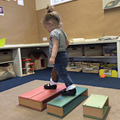 wants to use space. 'We can't have a dedicated room here, but we've reorganised so there is larger floor space,' she explains.
wants to use space. 'We can't have a dedicated room here, but we've reorganised so there is larger floor space,' she explains.
'The children can build with blocks and leave them there. Some of the creations are taking so long to put together that the children don't want them cleared away just because it's snacktime.
'We're reducing our furniture. Low-level storage takes up a lot of floor space, so we are buying vertical units and storing things the children don't use all the time higher up. We have designed a table that we can flip down off the wall and then flip up when we're not using it.'
Since returning, she has invested in sets of blocks for all four nurseries in the Naturally Learning chain, headquartered in Charlestown. She recommends specialist provider The New Factory, partnered with Fafu, which designs and manufactures specialist products for the early years.
'All the blocks on the market are quite expensive, but these are a lot cheaper. They are the best thing I have ever purchased. The children just play with them continually. They are encouraging the girls to do things that they wouldn't have done. I don't know whether it's because they are these lovely colours, beautiful natural stains, but I've observed girls who would normally just sit at the writing table doing amazing constructions.'
Mrs Richardson goes on to describe her observations of how block play promotes concentration and perseverance in young children. 'A pair of two-year-old boys were lining up blocks according to shape and colour,' she says. 'You could see the level of concentration as they lined them up and turned them around so they were all facing the right way. The care and attention to detail was amazing.'
She is also keen to highlight the benefits of block play for younger children. 'A little girl of 18 months built herself a very small bridge with just three blocks. She must have spent 20 minutes toddling backwards and forwards over it learning to balance.
'That's the simplest - three blocks and one child, then to real collaborative team building, planning, solving conflicts; everything you can imagine. We've only had the blocks for three weeks and the constructions are getting more and more complex.'
MORE INFORMATION
Community Playthings, www.communityplaythings.co.uk
Cosy, www.cosydirect.com
Early Excellence, www.shop.earlyexcellence.com
Early Years Resources, www.earlyyearsresources.co.uk
Fafu, www.fafuplay.com
Playforce, www.playforce.co.uk
Playgardens, www.playgardens.co.uk
-TS Group, www.tts-group.co.uk
BEST BUYS
Hollow blocks
From Community Playthings, you can buy either a set of Large Hollow Blocks (from £185, for a top-up set of eight blocks in three shapes) or individual blocks (from £22). Also available are a set of Mini Hollow Blocks (from £180 for an introductory set of seven blocks) or individual mini blocks (from £28). These can be stored in the Hollow Block Cart (£300).
Otherwise, try Fafu for a set of coloured birch plywood and beech hollow blocks designed by an English/Icelandic team. The set of Fafunian Adventure Blocks contains a 19-piece mini nursery set, a 26-piece pre-school set and a storage cart (£958).
Solid blocks
Unit blocks large and small are available from Community Playthings (larger blocks start at £170 for a supplementary set of 57 blocks in 14 shapes; the Introductory set of 92 blocks costs £240, and £390 with a block cart). Mini Unit Blocks come in 17 shapes and are available as single (91 blocks, £84) or double (182 blocks, £164) sets.
TTS supplies a range of solid blocks including a set of 52 Jumbo Blocks with a case (£59.95), a set of five Construction Trays filled with blocks and stacked on a pull-along wagon (£219.95) and a Creative Crate filled with 100 blocks in an assortment of shapes (£189.95).
At Early Years Resources, find a tray of 38 Natural Wooden Building Blocks (£15.95) and an equivalent-sized set of Wooden Colour Blocks (£18.95)
Something different
Early Excellence has an interesting selection of building blocks, including Mirror Blocks (from £25), Gem Blocks (from £30), Clear Perspex Blocks (£29.95), Multicoloured Perspex Blocks (from £35) and Ice Blocks (£9.95).
Playforce offers a large selection of Cork Blocks, including Block and Beam Construction Set (from £359), Block and Dowel Construction Set (from £319), 16- or 36-piece House Brick sets (from £159), and 16-, 28- or 44-piece Solid Block sets (from £169).
Playgarden has developed a range of Playbales, available in sets of four (£109), eight (£199) and 12 (£299).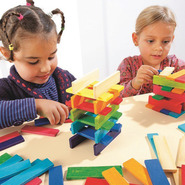
Cosy supplies a Rustic Construction range. This includes a 30-piece pack of Eco Building Logs (£74.99), 30-piece set of Small Wood Slice Blocks (£46.99) and 25-piece set of Giant Treeblocks (£41.99).
Wesco supplies 300 Tecap Construction Slats (£46.80), in natural materials and a selection of colours.
IN ADDITION
Community Playthings has a large selection of wooden vehicles, including Trucks, which can be bought in sets (from £259 for a set of five small trucks) or individually (from £46), and Village Vehicles available individually (£20), in sets of two (£40) and four (£72). Also on offer is a Helicopter (£53) and Aeroplane (£58). All vehicles come with at least one Villager, although it is also possible to buy a set of six 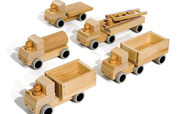 (£10).
(£10).
A set of three small-world Wooden Cars and a Bus (£46) are available from Early Excellence, together with a set of eight Wooden People (£9.50) that come in two sizes to represent adults and children. These resources can also be found as part of a Small World Resource Collection that includes a range of farm and wild animals, dinosaurs, wooden logs, fences and three books (£265).









